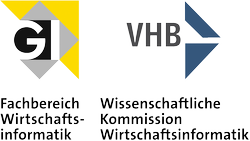Track 3: Integrated Systems in Service Industries
Professional services today must be efficient and standardized, but also customer tailored. A holistic management is obligatory to plan (strategic and operative) and deliver services obeying resource and quality constraints. Efficient integrated information systems (IIS) have to include customers, partners and contractors. Often external mobile systems (e.g. smartphones, touchpads), often causing 'bring your own device' challenges, must be integrated in IT-infrastructures and processes smoothly. Additionally often integrated business models and organizations must be considered. State of the art return on IT-investment (RoITI) and value of IT (ValIT) models must be developed and adapted. Powerful human-machine interfaces must be implemented for ease of use and usability. Often powerful standard software packages (e.g. CRM or ERP systems) like SAP must be selected, customized, introduced and migrated. Professional services are IIS enabled and based in many sectors, e.g. financial service providers, insurances, tourism, government, higher education, health or security and military services. Submissions are preferred with completed research on a high international level and an international/global focus. Both theoretical and applied submissions are welcome. Submissions should include relevant research questions, an appropriate research design and methodology and a comprehensive discussion of findings, recommendations and limitations. Real life case studies and action research submissions, to name only two, from practitioners are encouraged. All submissions should be theory and model based (e.g. procedure and reference models). Both empirical and design science research submissions are possible.
Topics
IIS for the abovementioned, but also other and hybrid service industries
Efficiency and usage of IIS and the relation to processes, data, and integrated business models
Development of IIS and prototyping with procedure and reference models in service industries
IT- and software services, software as a service (saas), web-services, IT-service management and ITIL
Configuration management for services
Integration of stationary and mobile systems
Invoicing, e.g., m(obile)-payment and electronic invoicing
Higher education IT, esp. student life cycle management systems, and e(lectronic)-learning systems and services
Customer relationship, customer knowledge management, CRM-/ERP-/... IIS, e(lectronic)-markets, e(lectronic)-government, Web 2.0/2.5/3.0/... and social media in service industries
BA/BI/BW IIS and decision support systems (DSS) in service industries
Track Chairs
Prof. Dr. Michael H. Breitner, Leibniz University Hanover, Germany
Prof. Dr. Matthias Schumann, Georg-August-University Göttingen, Germany
Programmkomitee
Prof. Dr. Hans-Jürgen Appelrath, University Oldenburg/OFFIS, Germany
Prof. Dr. Andrea Back, University St. Gallen, Switzerland
Prof. Dr. Martin Bichler, Technical University Munich, Germany
Prof. Dr. Hans Ulrich Buhl, University Augsburg, Germany
Prof. Dr. Dimitris Karagiannis, University Vienna, Austria
Prof. Dr. Ulrike Lechner, Universität der Bundeswehr München, Germany
Prof. Dr. Jan Marco Leimeister, University Kassel, Germany
Prof. Dr. Gustaf Neumann, Vienna University of Economics and Business, Austria
Prof. Dr. Alexis Papathanassis, Bremerhaven University of Applied Sciences, Germany
Prof. Dr. Jan M. Pawlowski, Jyväskylän Yliopisto, Finland
Prof. Dr. Niels Pinkwart, Technical University Clausthal, Germany
Prof. Dr. Leena Suhl, University Paderborn, Germany
Jun.-Prof. Dr. Hans-Jörg von Mettenheim, Leibniz University Hannover, Germany
Prof. Dr. Peter Weber, South Westphalia University of Applied Sciences, Germany














